16 Dark Comedies That Still Hit All the Right Notes
What sets dark comedies apart is their ability to laugh at life’s messiest moments, often blending tragedy with humor. These films explore tough subjects like loss, guilt, or even the absurdity of human existence, while still making us laugh. They offer a unique combination of wit and bite, leaving us both entertained and slightly uncomfortable. If you enjoy humor that pushes boundaries and challenges your thinking, dark comedies are worth checking out.
This post may contain affiliate links, which helps keep this content free. Please read our disclosure for more info.
Dr. Strangelove or How I Learned to Stop Worrying and Love the Bomb
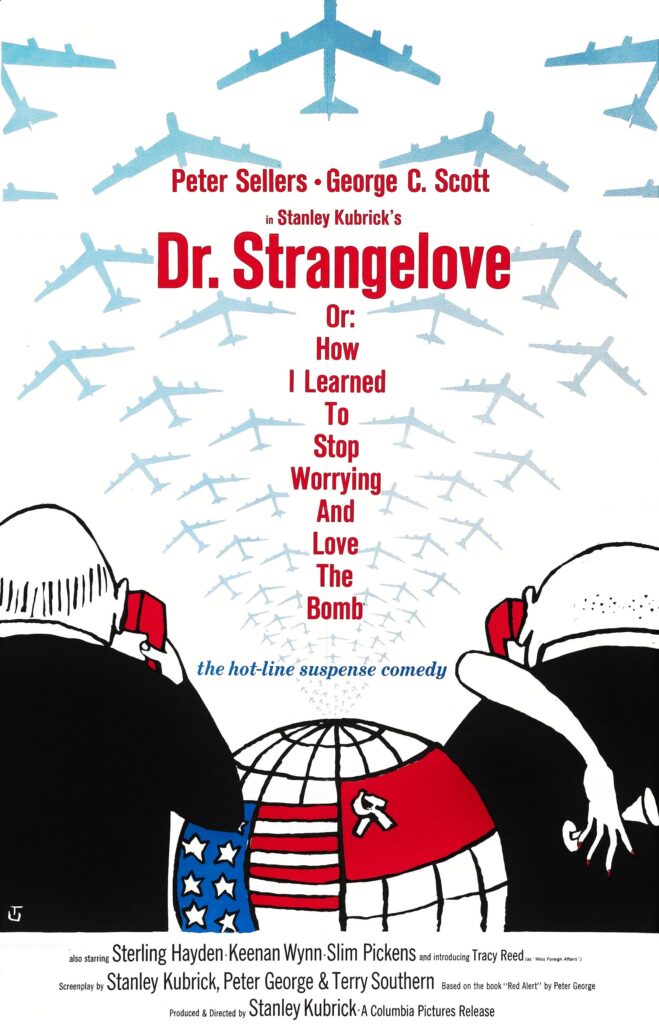
Premiering in 1964, this Stanley Kubrick classic mixes satire with dark humor to explore the absurdities of nuclear war. The film’s best feature is its ability to make light of a very serious subject, using slapstick moments to highlight the ridiculousness of global conflict. With its memorable characters, like Peter Sellers’ multiple roles, and sharp, witty script, it remains relevant for audiences today. The dark comedy in Dr. Strangelove is just as impactful now as it was during the Cold War, making it a timeless piece. The film’s dry humor and farcical situations still hold up as a brilliant commentary on the absurdity of war.
What sets this film apart is its unique tone, combining high-stakes political situations with over-the-top humor. Sellers’ portrayal of three distinct characters blends dark satire with impeccable timing. The film’s setting, combining a war room with comedic chaos, provides a backdrop for its deeper commentary. The humor makes us laugh while simultaneously reflecting on the real-world consequences of power and control. Dr. Strangelove continues to resonate with audiences due to its masterful balance of comedy and societal critique.
Fargo

Released in 1996 by the Coen Brothers, Fargo is a dark comedy that tells the story of a botched kidnapping and its deadly consequences. The film excels because it mixes crime with absurd moments, creating a balance that keeps audiences both amused and uncomfortable. With Frances McDormand’s brilliant performance as Marge Gunderson, the film remains a standout in the genre. The blend of quirky characters, a chilling crime, and offbeat humor keeps Fargo fresh and relevant. Even today, the way it handles violence and absurdity keeps it at the top of the dark comedy genre.
Fargo remains one of the best examples of how to intertwine crime with humor without losing its impact. The unpredictable nature of the characters and the situations they find themselves in adds to the suspense, while the humor lightens the tone just enough. The memorable accents and oddball interactions also make it stand out. The film’s ability to make you laugh at the most unsettling moments is what gives it lasting appeal. It’s a perfect example of how the Coen Brothers have mastered the art of dark comedy.
The Big Lebowski
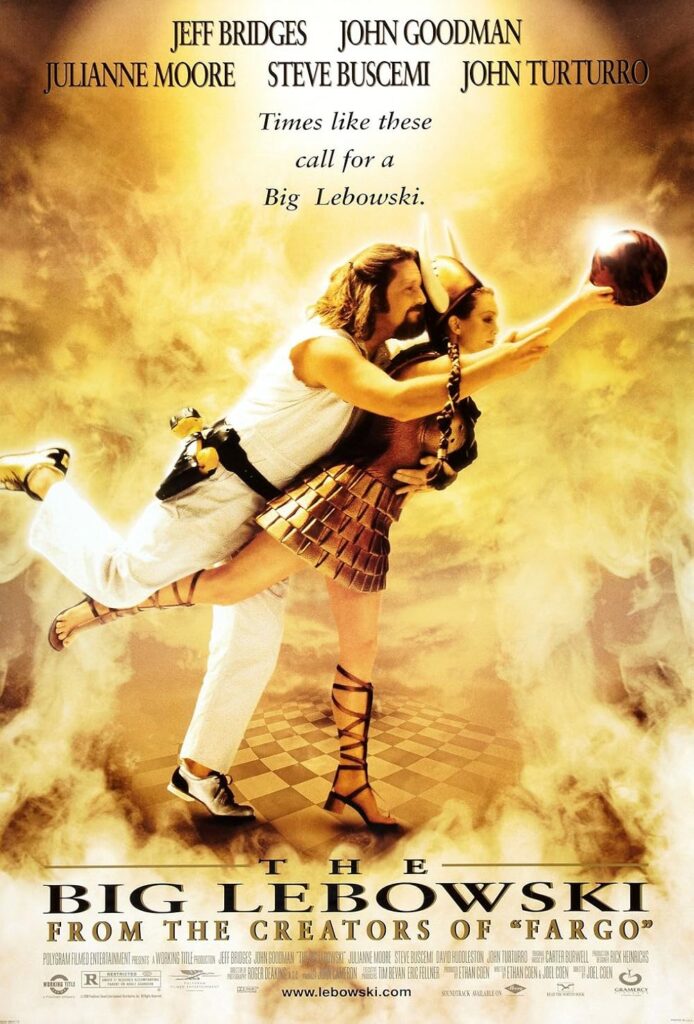
Released in 1998, The Big Lebowski has become a cult classic that blends crime, comedy, and a sense of absurdity. The film’s charm lies in its oddball characters, especially Jeff Bridges as The Dude, who navigates a world of confusion with little care. Its offbeat humor, along with a strange series of events involving a missing wife and stolen money, remains a source of laughter even years after its release. The film’s eccentric approach to storytelling, paired with unforgettable lines and performances, keeps it relevant in the world of dark comedy. The Dude’s laid-back attitude amidst chaos continues to make this film a fan favorite.
What makes The Big Lebowski unique is how it takes the conventions of a crime thriller and turns them into something hilariously surreal. The combination of eccentric characters, witty dialogue, and the chaotic journey of The Dude creates an experience that’s both humorous and memorable. The film thrives in its ability to turn ordinary situations into absurd dilemmas. Over the years, its dark comedy has only grown more appreciated for its quirky and unforgettable moments. The Big Lebowski continues to hit all the right notes, resonating with both new and returning audiences.
American Psycho
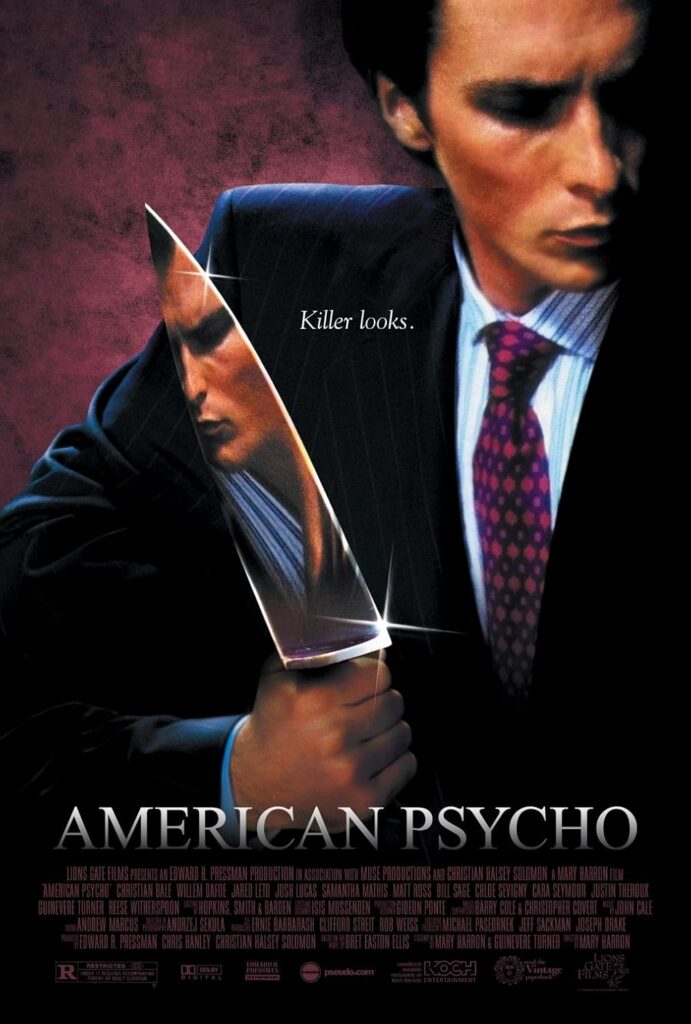
American Psycho, released in 2000, is a dark comedy that explores the life of Patrick Bateman, a wealthy New York banker who leads a secret life as a murderer. The film’s satire is sharp, using humor to comment on the vanity and excess of 1980s Wall Street. Christian Bale’s portrayal of Bateman mixes chilling moments with darkly comedic absurdities, making it a standout in the genre. The mix of psychological thriller and dark comedy keeps audiences engaged even as they are confronted with Bateman’s increasingly erratic behavior. The sharp contrast between humor and horror remains one of the film’s most effective elements.
What makes American Psycho still resonate today is its ability to satirize consumer culture and excess with biting humor. The film’s absurdity, combined with a very real and unsettling portrayal of its lead character, makes it a powerful commentary on the superficial nature of wealth and status. Bale’s performance ensures the film remains memorable, as his detached, almost robotic character brings the dark comedy to life. The film’s themes of isolation and identity crisis are delivered with humor that cuts through the discomfort. It remains a brilliant example of how dark humor can be used to shed light on serious issues.
In Bruges

In Bruges, released in 2008, is a dark comedy that revolves around two hitmen, played by Colin Farrell and Brendan Gleeson, hiding out in the medieval city of Bruges. The film combines crime and dark humor, exploring themes of guilt, redemption, and moral conflict. Farrell’s performance as Ray, a hitman dealing with the aftermath of a botched job, brings a mix of humor and pathos to the film. The film’s witty script, full of sharp one-liners and awkward situations, keeps it fresh and engaging. Its mix of bleak situations and comedy makes it stand out as one of the more unique dark comedies.
The film’s charm lies in its ability to mix heart-wrenching moments with bizarre humor, as the characters’ conflicting emotions lead to both laughter and tension. The city of Bruges also plays a key role in the film, its beauty contrasting with the violence and turmoil faced by the characters. In Bruges explores deeper questions about morality, regret, and personal redemption, all while delivering laughs. The dark humor is not just there for shock value; it adds to the story’s emotional complexity. This balance between comedy and tragedy has made the film a standout in the genre.
Death at a Funeral
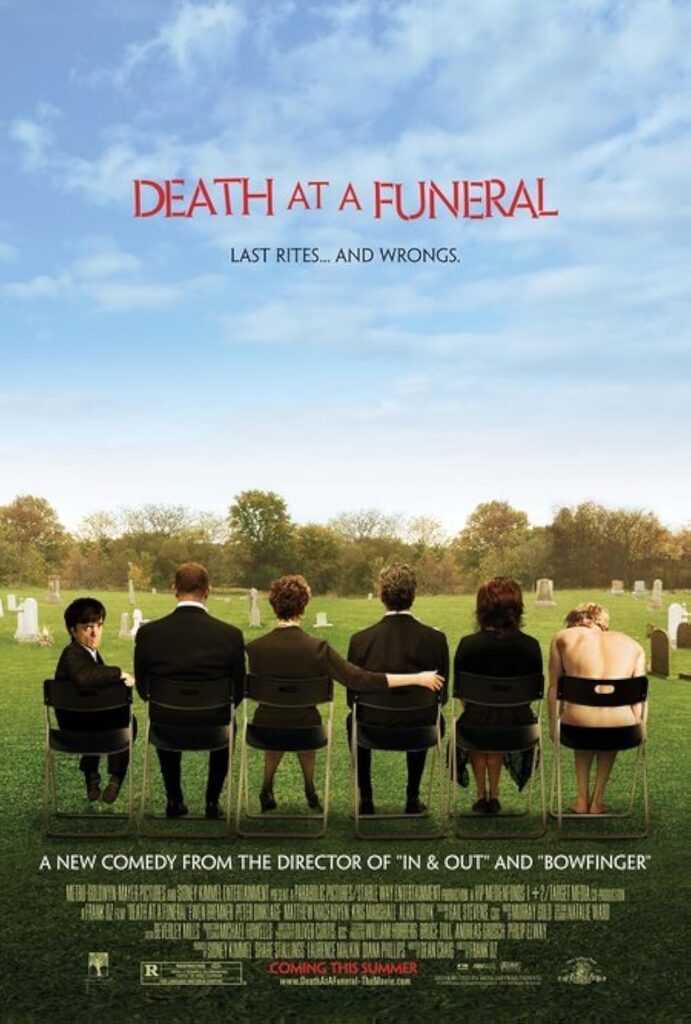
Death at a Funeral, a British dark comedy from 2007, revolves around a dysfunctional family gathered for the funeral of their patriarch. The film expertly mixes absurd moments of slapstick with dark themes like death, secrets, and betrayal. What stands out is its sharp humor in the midst of a tragedy, as the family members try to deal with the unexpected chaos that unfolds during the service. The characters’ reactions to these bizarre events create an unsettling but humorous atmosphere. Even today, the film’s ability to balance dark topics with comedy continues to draw laughter.
The ensemble cast, including Matthew Macfadyen and Alan Tudyk, brings humor to a series of unfortunate events, making even the most morbid situations oddly entertaining. Its humor doesn’t shy away from the discomfort of dealing with a funeral, instead using it as a platform to explore family dynamics. The slapstick moments, mixed with sharp dialogue, keep the film engaging and lively. Despite the somber setting, the characters’ over-the-top reactions to everyday tragedies create a hilarious contrast. Death at a Funeral proves that dark comedies can find humor in the most unlikely places.
The Royal Tenenbaums

Released in 2001, The Royal Tenenbaums is a dark comedy by Wes Anderson that focuses on a dysfunctional family of gifted individuals. The film’s charm comes from its quirky characters, dry humor, and its exploration of family dynamics and personal failures. The Tenenbaum family’s story is full of sadness and absurdity, yet Anderson’s distinct style turns it into a witty and engaging experience. The film uses both humor and emotional moments to create a unique atmosphere that still resonates with audiences today. Its ability to tackle heavy topics like family, failure, and regret with a light-hearted approach is what makes it stand out.
The film’s visual style, featuring meticulous set designs and colorful costumes, adds to its comedic appeal. The characters, especially Gene Hackman’s portrayal of Royal Tenenbaum, bring a sense of complexity to the humor, making their flaws both laughable and heartbreaking. The way the film uses deadpan humor to explore deep emotions keeps it fresh and relatable, even years later. The Royal Tenenbaums blends absurdity with real human emotions, making it a perfect example of dark comedy done right. Its balance of wit and heart continues to resonate with viewers today.
Little Miss Sunshine
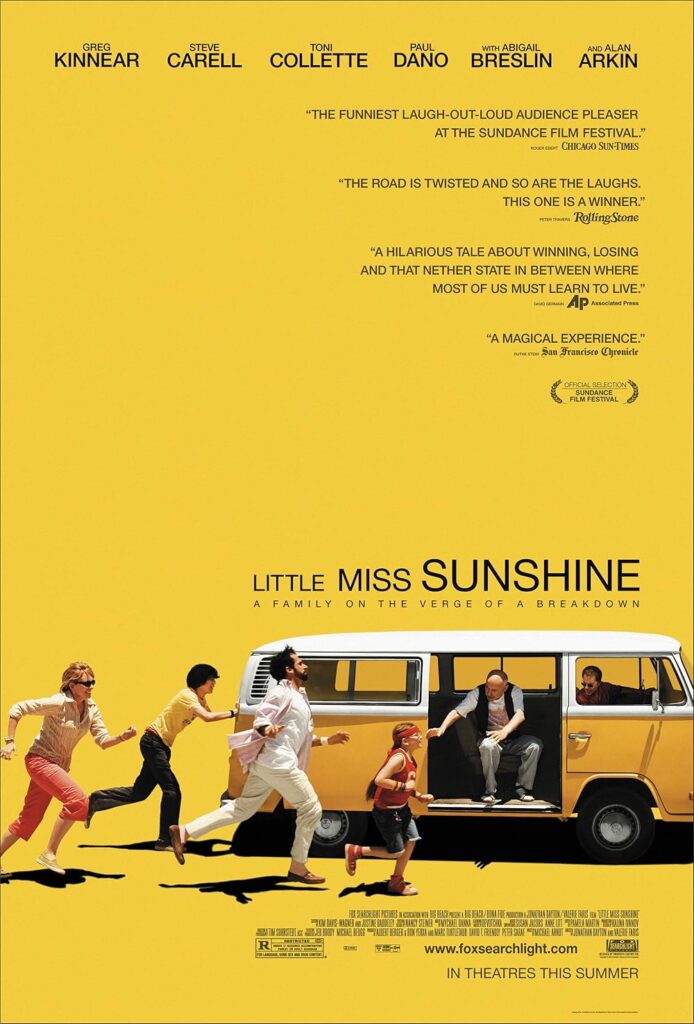
Premiering in 2006, Little Miss Sunshine is a dark comedy that follows a dysfunctional family on a road trip to a beauty pageant. The film’s charm lies in its ability to blend humor with sensitive themes like failure, family struggles, and personal identity. The family’s chaotic journey to the pageant is filled with oddball moments and awkward interactions that make the dark humor feel natural. Steve Carell, Greg Kinnear, and Toni Collette provide standout performances, each bringing their own brand of humor to the mix. The film’s humor is both quirky and heartfelt, making it a memorable dark comedy.
Despite the film’s comedic elements, it tackles real issues like self-worth and the pressure of societal expectations, all while maintaining a lighthearted tone. The film’s road trip setting adds to the absurdity of the family’s interactions, making even the most uncomfortable situations feel relatable. The characters’ flaws are portrayed in a way that makes them endearing rather than pitiful. Little Miss Sunshine proves that comedy can find its place in the most unlikely situations. Its ability to mix humor with emotional depth is why it continues to be celebrated as a modern classic in dark comedy.
The Death of Stalin
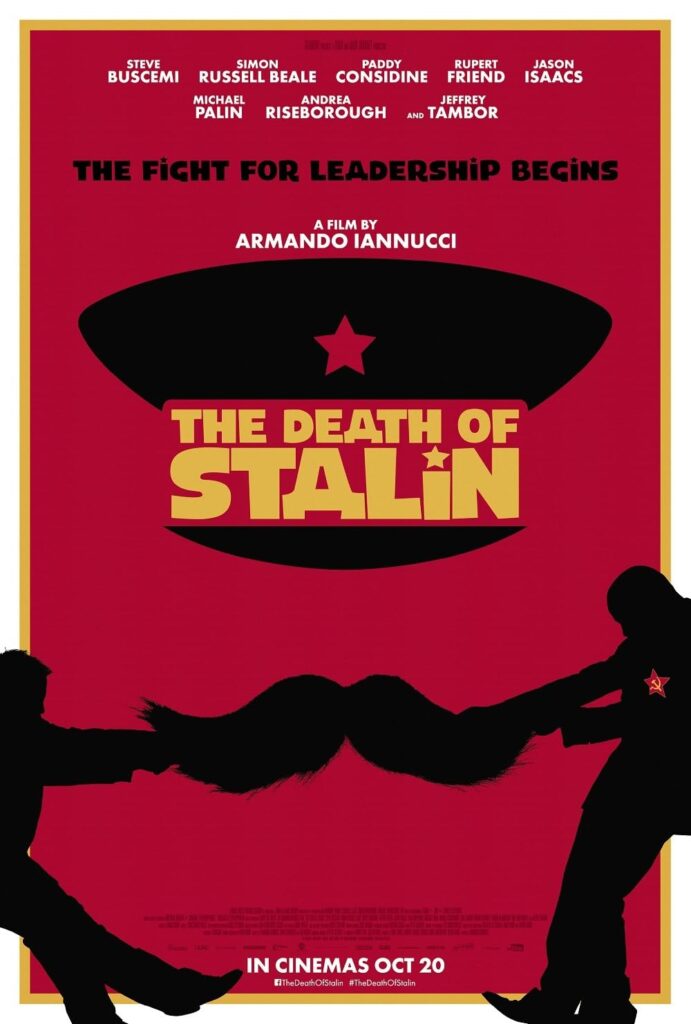
Released in 2017, The Death of Stalin is a dark political comedy that satirizes the power struggle following the death of Soviet leader Joseph Stalin. The film’s strength lies in its ability to make humor out of historical events and political intrigue, all while maintaining a sharp, cynical tone. The ensemble cast, led by Steve Buscemi and Simon Russell Beale, delivers perfectly timed performances that add to the film’s absurdity. The film blends slapstick with sharp satire, making the political chaos of the time both funny and chilling. It remains relevant for its dark take on history and the ridiculousness of power.
The movie stands out for its ability to take a tragic historical moment and turn it into a farce, using humor to comment on the dangers of political power. Its deadpan delivery and absurd moments keep the dark humor from feeling too heavy, while still delivering a sharp critique of the system. The historical context, combined with the comedy, makes this film both informative and incredibly entertaining. The characters’ reactions to the chaotic political environment provide a hilarious contrast to the dire circumstances. The Death of Stalin is a perfect example of how dark comedy can use history to shine a light on modern issues.
The Lobster
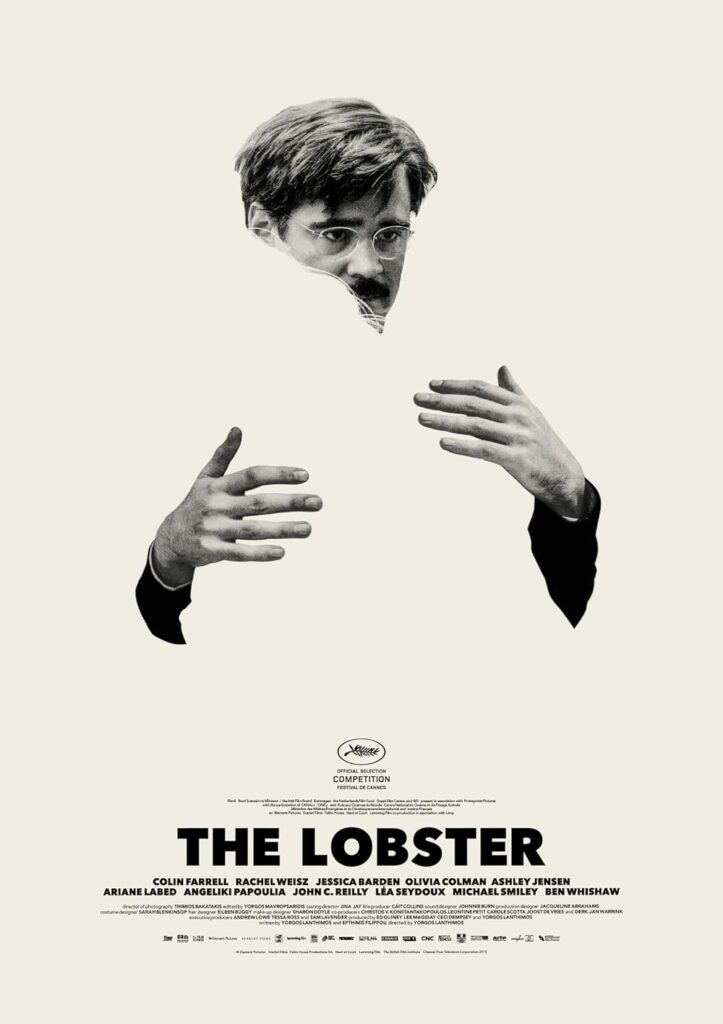
The Lobster, released in 2015, is a dark comedy set in a dystopian future where single people are forced to find a mate or face being turned into an animal. The film’s dark humor comes from its deadpan delivery and the absurdity of the society it depicts. Colin Farrell and Rachel Weisz star in a film that blends the bizarre with the deeply uncomfortable, making it both thought-provoking and hilarious. The film’s ability to take a serious look at societal expectations of love and relationships through a comedic lens makes it stand out. It remains relevant for its unique take on modern romance and social pressures.
What makes The Lobster particularly interesting is its ability to make us laugh at the absurdity of a dystopian society while also offering a commentary on the real-world pressures of relationships. The strange and offbeat tone is maintained throughout, making even the most awkward moments feel surreal yet entertaining. The film’s humor is often dark and uncomfortable, yet it manages to highlight the absurdity of human nature. If you enjoy films that push boundaries and explore societal norms through satire, this one is sure to leave an impression. It shows that dark comedies can offer something truly unique in both storytelling and tone.
Heathers

Released in 1989, Heathers is a dark comedy that explores high school life, murder, and societal pressures. The film follows Veronica (Winona Ryder) as she gets tangled in a deadly relationship with a troubled classmate, Jason (Christian Slater). Its strength lies in its ability to mix teen drama with dark humor, turning bullying and murder into satirical commentary on high school life. The sharp dialogue and over-the-top characters help make Heathers an unforgettable cult classic. Even today, its dark take on teenage angst and social hierarchies still hits home.
The movie’s success comes from its biting satire and its ability to address real issues like teen suicide, bullying, and the toxic nature of high school social structures while still being funny. The outlandish moments, like the murderous pranks and exaggerated personalities, give it a surreal and darkly comedic feel. The film continues to be a favorite for its quirky, sharp humor and its exploration of toxic relationships and peer pressure. Over time, its unapologetic darkness and witty script have made it a staple of dark comedy. Heathers proves that high school comedies don’t need to be lighthearted to leave a lasting impact.
The Favourite
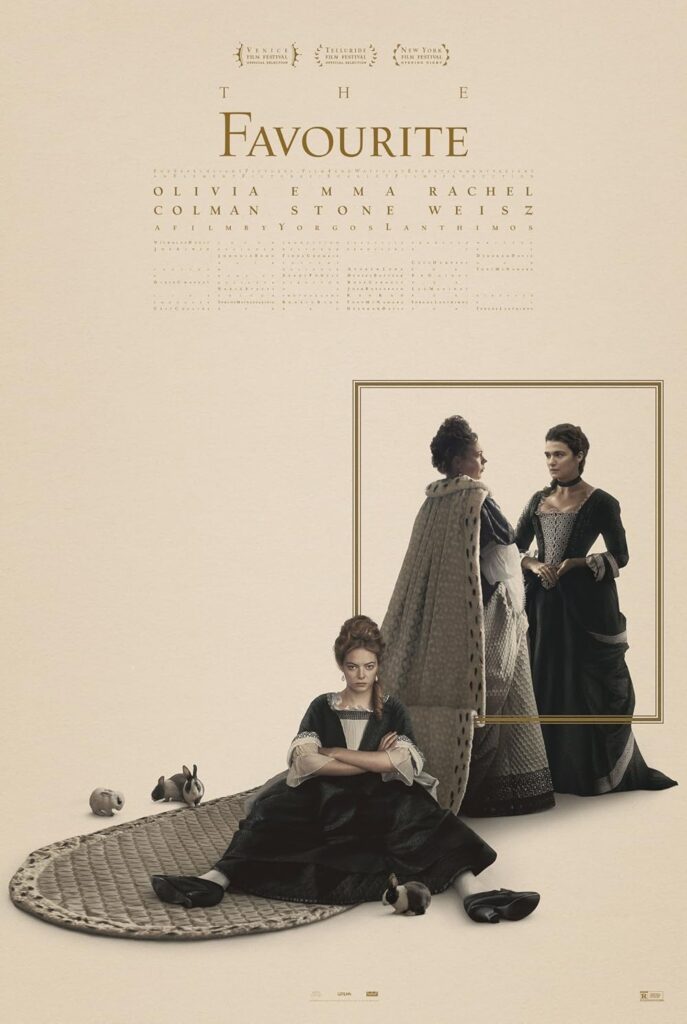
Premiering in 2018, The Favourite is a dark historical comedy that tells the story of the rivalry between two cousins vying for the favor of Queen Anne in 18th-century England. The film is known for its sharp humor, biting dialogue, and the absurdity of the royal court’s politics. Olivia Colman, Emma Stone, and Rachel Weisz bring complex and darkly humorous characters to life. The film’s combination of historical events with dark comedy, all while exploring themes of power and manipulation, makes it both captivating and hilarious. Its ability to balance drama and humor has earned it widespread acclaim.
What sets The Favourite apart is its sharp, almost cruel humor, particularly in the way the characters manipulate each other to gain favor. The film’s exaggerated portrayal of the royal court’s backstabbing and scheming adds a layer of absurdity to the historical events. Colman’s portrayal of Queen Anne, with her emotional vulnerability, brings both humor and pathos to the film. The dark humor, combined with excellent performances, keeps the audience both entertained and unsettled. The Favourite proves that historical dramas can also be ripe for dark comedy, offering a fresh perspective on power and politics.
Harold and Maude
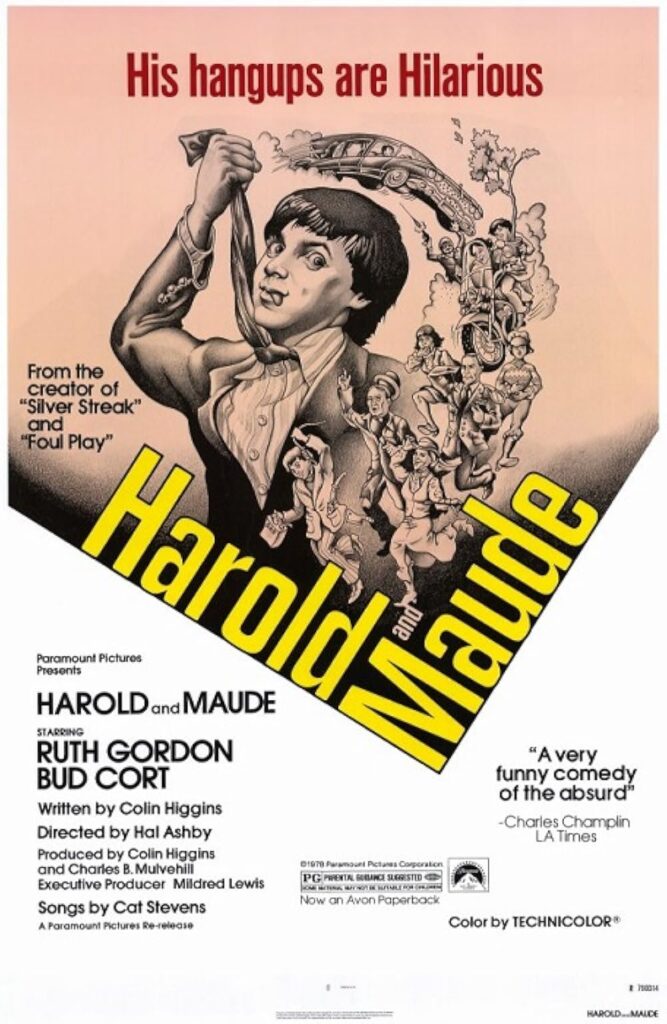
Harold and Maude premiered in 1971 and is one of the earliest examples of dark comedy mixed with romance. The film tells the story of Harold, a young man obsessed with death, and Maude, an eccentric older woman with a zest for life. The film’s humor stems from the stark contrast between the characters’ views on life and death, making it both heartwarming and darkly comedic. Its offbeat humor and exploration of taboo subjects like death and unconventional relationships still resonate today. Even after decades, it remains a cult favorite for its unique blend of comedy and existential themes.
The film is beloved for its quirky and irreverent approach to love, death, and societal expectations. Harold’s obsession with fake suicides and his morbid outlook is balanced by Maude’s energetic and free-spirited personality. The unlikely romance between the two challenges traditional notions of age and social norms, all while delivering humor that’s both touching and dark. The film’s wit and offbeat charm make it a timeless classic in the dark comedy genre. Harold and Maude proves that dark comedies can offer both laughs and life lessons, without being afraid to explore deeper existential themes.
The House
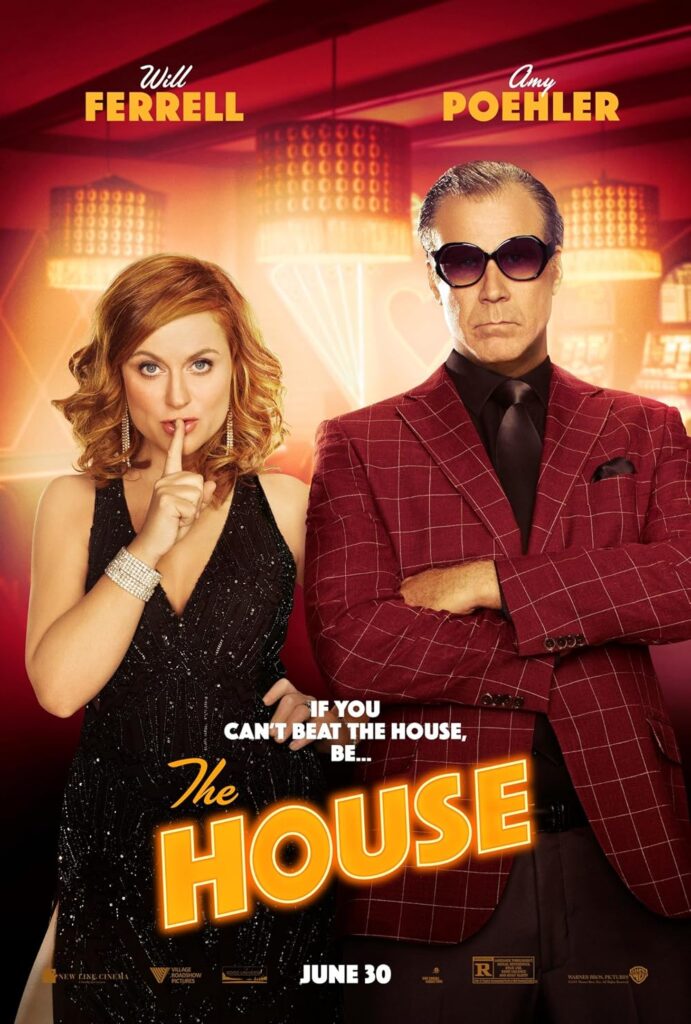
In 2017, The House was released, starring Will Ferrell and Amy Poehler as parents who start an underground casino to pay for their daughter’s college tuition. The film’s humor arises from the absurdity of the situation and its wild take on desperate parents trying to solve their problems. The dark comedy plays on the desperation and poor decision-making of its characters, resulting in an over-the-top adventure. The film’s exaggerated antics and ridiculous consequences keep the laughter rolling throughout. Despite the dark undertones of illegal activities, the film manages to remain lighthearted and fun.
The House is effective because it mixes dark humor with relatable themes of financial struggle and family loyalty. Ferrell and Poehler’s chemistry makes their characters’ outlandish decisions feel both hilarious and ridiculous. The humor is made more absurd by the increasingly outrageous scenarios that unfold, from running a casino to dealing with shady criminals. While the characters’ actions are extreme, their motives are grounded in the desire to help their daughter, making the film both funny and heartfelt. The House proves that even dark, taboo subjects like crime can lead to comedic gold.
Thank You for Smoking
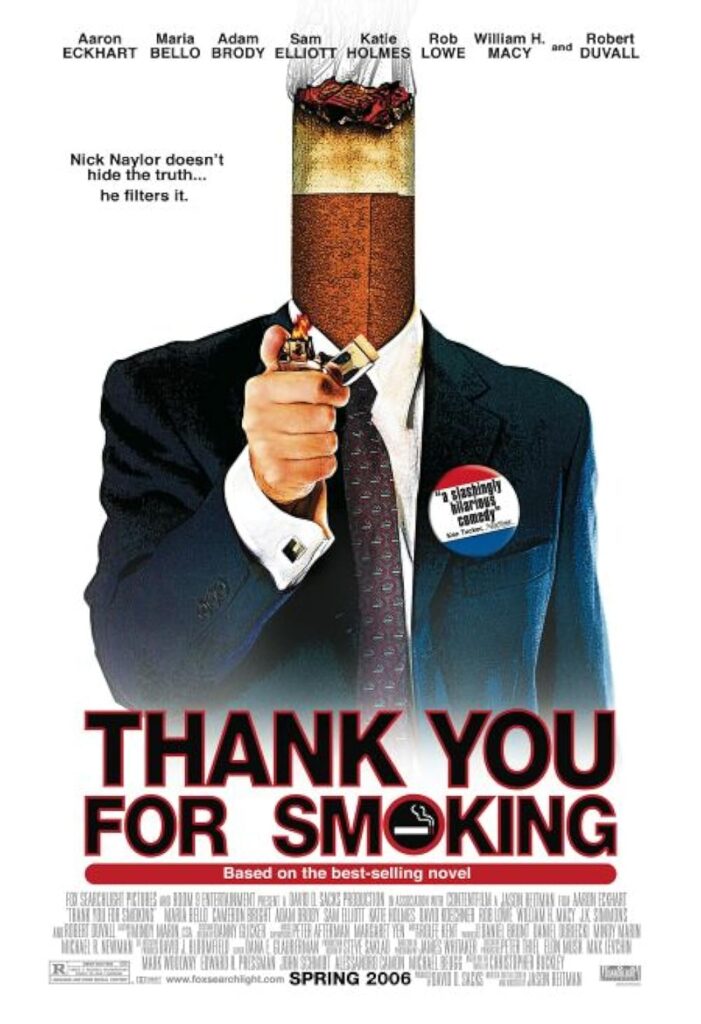
Released in 2005, Thank You for Smoking is a dark comedy that satirizes the world of tobacco lobbying and public relations. The film, starring Aaron Eckhart as Nick Naylor, a smooth-talking spokesperson for the tobacco industry, is both hilarious and a sharp critique of the industry’s tactics. The film’s dry humor and clever writing make light of serious issues, showing the absurdity of public relations work in industries with questionable ethics. Its satire of corporate spin and moral ambiguity still resonates with audiences today. With witty dialogue and well-timed comedic moments, the film offers a humorous take on a controversial topic.
What makes Thank You for Smoking stand out is its ability to balance humor with serious social commentary. Naylor’s character is a charming, morally ambiguous figure who navigates the world of corporate lobbying while facing the consequences of his actions. The film’s satire takes aim at both the tobacco industry and the media’s role in spreading misleading information. The humor in Thank You for Smoking works because it exposes the ridiculousness of corporate manipulation without making it feel too heavy-handed. It shows that dark comedy can effectively address societal issues while still being entertaining.
The Grand Budapest Hotel
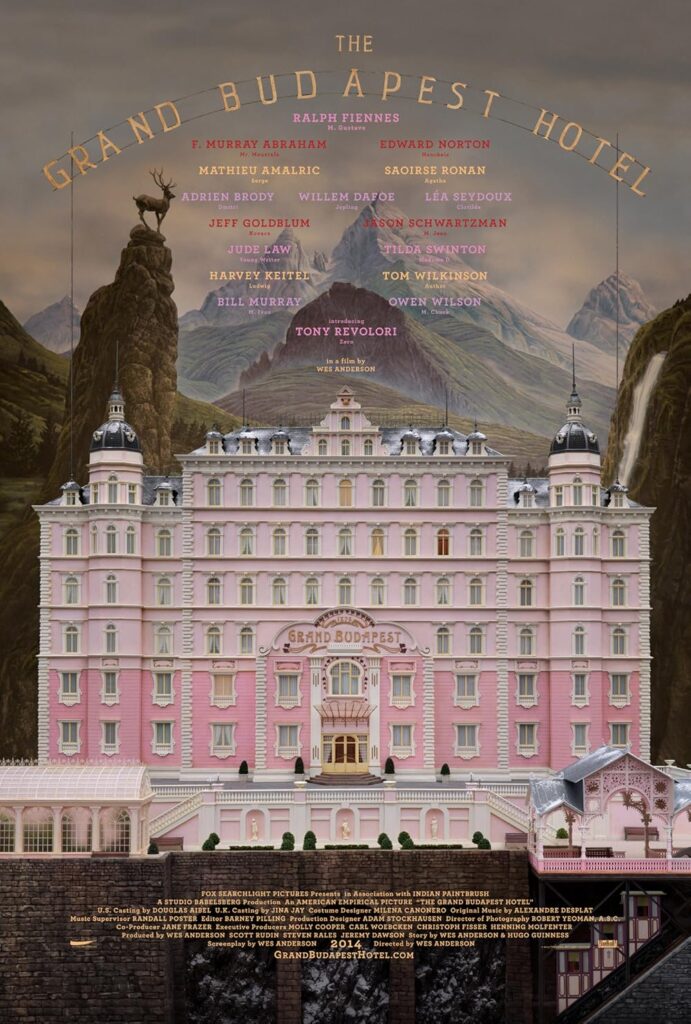
Released in 2014, Wes Anderson’s The Grand Budapest Hotel is a dark comedy that tells the story of a hotel concierge’s adventure with a priceless painting and a family fortune. The film’s humor is often subtle and quirky, with its vibrant visual style and eccentric characters. What sets it apart is its ability to blend slapstick humor with more serious themes like war and loss. The film’s absurd situations and dry wit keep it engaging and lighthearted, despite its darker undertones. Even today, the unique combination of Anderson’s distinct style and dark humor makes it a standout film.
The Grand Budapest Hotel thrives on its impeccable set design, quirky characters, and deadpan dialogue. The film explores the intersection of comedy and tragedy, as characters face betrayal, crime, and loss, all while maintaining a humorous tone. The ensemble cast, including Ralph Fiennes and Willem Dafoe, brings a sharpness to the dialogue that enhances the film’s humor. Its whimsical yet poignant storylines add a layer of depth to the comedy, making it more than just a lighthearted romp. The Grand Budapest Hotel is a perfect example of how dark humor can be both visually stunning and thought-provoking.
This article originally appeared on Avocadu.
